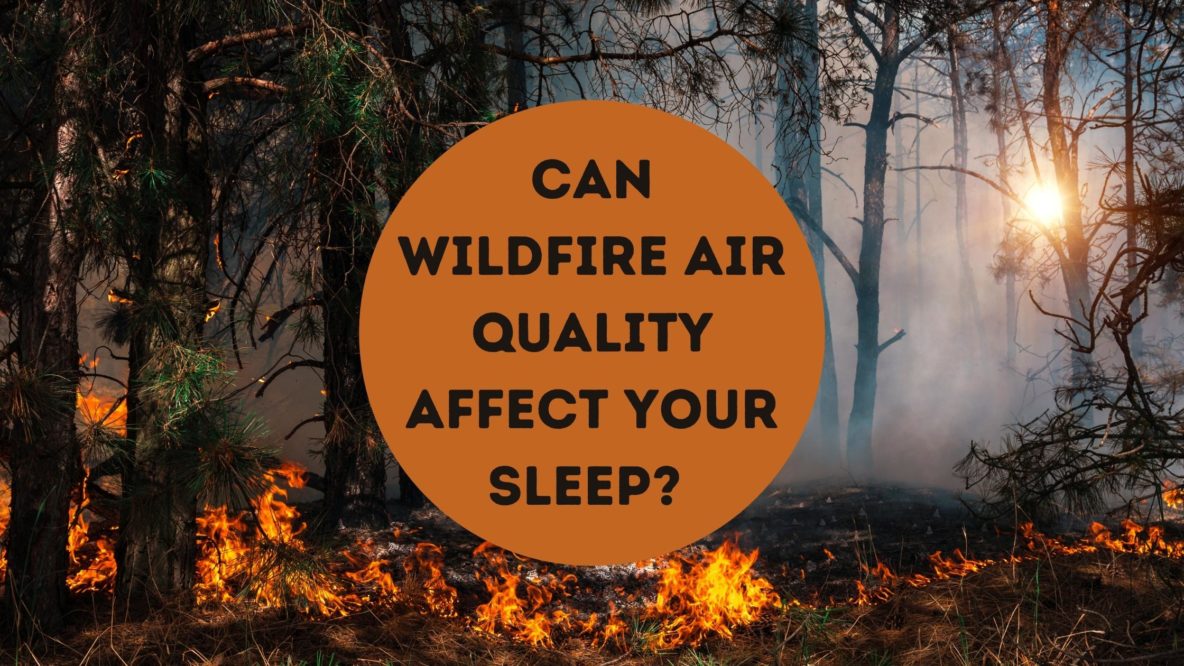Can Wildfire Air Quality Affect Your Sleep

- A Promising Paradigm Shift: New Research Challenges the CPAP-First Approach to OSA Treatment - September 5, 2023
- Understanding Sleep Meditation Techniques - July 30, 2021
- How Online Learning Has Affected Sleep for Students - July 13, 2021
It’s wildfire season, and that means that air quality across the country is taking a hit. And this year it’s not just the states with active fires that are affected. High winds have been blowing smoke and ash across the country, as well as bringing smoke from Canadian fires across the border. If you’re in an area with wildfires, your homes and property are your biggest concern. But for anyone within range of wildfire aid quality conditions, your sleep may be affected as well.
What Makes Wildfire Smoke so Dangerous?
Smoke from wildfires can be deadly. Smoke contains a number of harmful elements, including:
- Particulate matter
- Hydrocarbons
- Ultrafine particles
- Airborne chemicals such as carbon dioxide and black carbon
These can irritate the throat and lungs, causing nasal congestion or making your eyes sting or water. When wildfire smoke travels across the country, it carries all these harmful elements too. Inhaling wildfire smoke, even hundreds of miles away from the fire, can threaten your overall health and impact your sleep.
Who has the Highest Risk?
The CDC has outlined those who have a higher risk from inhaling wildfire smoke. This includes:
- Anyone with a preexisting lung disease
- Anyone with a preexisting heart disease
- Older adults
- Pregnant women
- Young children
Signs of Smoke Inhalation
If wildfires are burning in your area, check the Air Quality Index and watch for local alerts that may warn you to stay inside and keep the windows closed. Some common symptoms of smoke inhalation can include:
- Difficulty breathing
- Burning eyes
- Watering eyes
- Chest pain
- Fatigue
- Muscle aches
Air pollution can cause symptoms of a cold or allergies, such as a sore throat, cough, headache, or even nausea. High air pollution even contributes to low mood and feelings of depression and anxiety.
Wildfire Smoke and Your Sleep
So what does this have to do with sleeping? Wildfire smoke increases air pollution levels drastically. A wildfire nearby can cause extremely poor air quality, making it dangerous to be outside. The particles in smoke not only damage your airway and lungs, but they can also affect the brain. In fact, long-term exposure to high levels of air pollution can damage your CNS, or central nervous system.
You can protect your home by assessing how well your house is protected from the outside environment. To sleep better, and avoid the health risks of smoke inhalation, you can:
- Keep your windows closed at all times and turn off your continuous ventilation systems that pull outside air into your house without filtering.
- Make sure your windows and doors are properly sealed.
- Get an air filtration system that will keep the air inside your home free from dangerous air pollutants.
- Stay inside and keep your children and pets in the house.
Tips to Sleep Better
If you’re in a wildfire zone, chances are you’re feeling stressed. The air is hazy with smoke, and you’re worried about your family and friends. During this stressful time, prioritize your sleep. Getting a good night’s sleep will help you be prepared to take action or offer support as needed.
Before getting into bed, take a few minutes to destress and relax. This could be anything from reading a book to taking a bath. You may find it helpful to listen to a meditation or do some breathing exercises.
Once you feel calm, head to bed. Your room should only be for sleeping, so leave your phone outside. Avoid reading the news or scrolling social media while in bed.
If you can’t sleep, get up and do a relaxing activity for a few minutes. When you feel tired again, go back to bed and try again.
Sound Sleep Medical
Stress can make it very difficult to sleep and poor air quality can have a major impact on your overall health as well as your ability to sleep at night. If you’re exposed to wildfire smoke, monitor your symptoms and the symptoms of your loved ones. Keep the air in your home smoke-free and limit time outdoors. If you experience shortness of breath or trouble breathing, seek medical care immediately.
Having trouble sleeping? Visit us at Sound Sleep Medical and find out what you can do to get a good night’s sleep every night.
